Work for a programmer in the USA: 5 simple steps
 An article about what to do for those who want to move to work in the United States. I suggest engineering positions for which it is easiest to get visas, but perhaps the article will be useful to other specialists.
An article about what to do for those who want to move to work in the United States. I suggest engineering positions for which it is easiest to get visas, but perhaps the article will be useful to other specialists.My experience is somewhat different from the one described below (I got a job in the USA after an internship). But for 4 years in the USA I talked to people who came here in different ways and gained some experience. So if I really wanted to find a job in the USA today, I would act approximately as described below.
I apologize in advance if my tone seems to someone to be a mentor - I have no ambitions to teach others life, I just sometimes get this style.
Work visa H1B
In one of my articles I wrote about the topic of work visas in detail. The summary is as follows: to work in the United States without a residence permit or citizenship, you need to get a visa with the right to work - a visa like H1B. In order to get this visa, it is necessary that the future employer should prepare a package of documents for a foreign worker and pay rather big duties. Usually one visa costs $ 5000-10000 for an employer. There are other, less standard methods, but usually they are used much less.
')
From the written it follows that, since the visa process is not fast, expensive and difficult, only firms that can afford it are engaged in it.
A bit of math
In the question of finding a job, I am a supporter of the theory of probability. In my picture of the world, this means that no matter how small the probability of finding a job, if you try a sufficiently large number of times, you will definitely succeed.
Therefore, if you want to work in the US, then you should not bet on one (or even two or three) dream firms. It seems to me that the strategy of sending summaries and interviews to the maximum is the best. If there is no offer, then there will be an interview experience, and this is also a very valuable skill in finding a job. And if the offer is, but not to their liking, it’s still much easier to refuse than to get a job offer.
On the other hand, of course, you should not send out a resume to all firms at once. It is much easier and more convenient to divide them into small groups and simultaneously talk in a small number (say, up to five). And adapt your resume and strategy gradually, learning from mistakes that will certainly be. Especially at first.
Step 1: We are looking for candidates for employers
As I have already mentioned, not all firms in the United States make work visas. But even from the small number who are engaged in this, it is quite possible to find a couple of dozen suitable ones.
For example, here you can find a list of companies that deal with work visas. Submitting a resume without a residence permit or right to work in the United States, it makes sense only to companies that are already engaged in visas for employees. Unless you are a mega specialist in a narrow area, and firms will fight for you. In 99.9% of programmers, this is not our case.
In our case, we are interested in firms that do not just do work visas, but do them a lot and relatively long ago. This is how the TOP 25 list looks like:
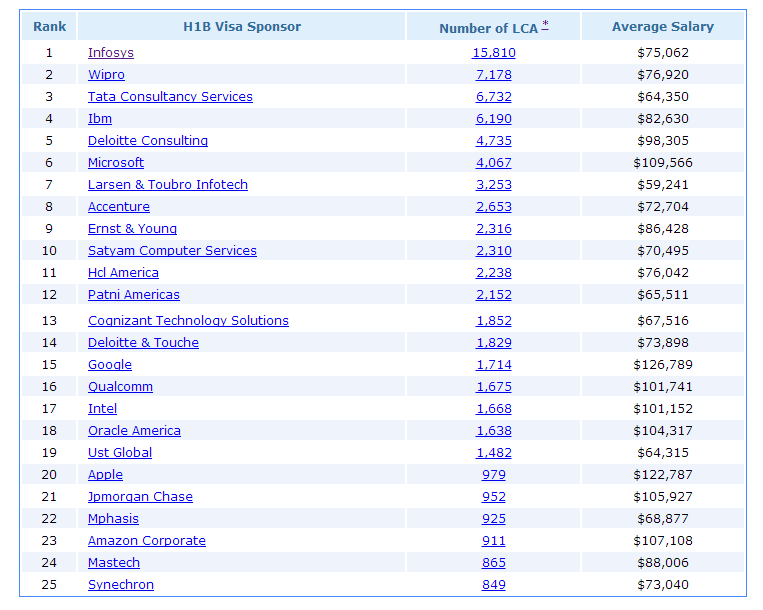
For convenience, there are also exemplary salaries for those who receive work visas. The numbers are, in fact, quite arbitrary, but they are sufficient to understand that, in terms of salary, it is better to work at Google than at Accenture.
Step 2: Secondary Filter
Now we look at the detailed data. For example, on the leader of our hit parade, Infosys.
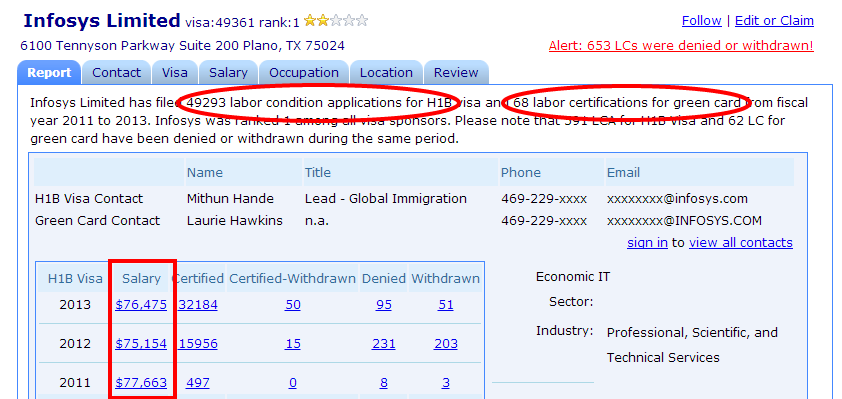
And what do we see? For 3 years, they submitted almost 50,000 applications for work visas, and only 68 applications for residence permits for employees, aka green card *. If you plan to go to work in the United States for a long time (or at least have such an opportunity), it is better to look for an employer who not only actively makes working visas, but also a residence permit, too. Another alarming trend is the reduction of salaries. So Infosys is clearly not suitable. Cross out.
(*) Making a residence permit at the expense of the employer is a standard practice in many firms.
Step 3: Patiently waiting for the right moment.
There is one VERY IMPORTANT NUANCE . Acceptance of applications for work visas takes place somewhere from April 1 to 5. Everything. Therefore, you need to pass an interview, get an offer and prepare all documents for submission before April 1. This leaves very little time for maneuver, unfortunately, and usually means that sending resume should be started somewhere in October, and the whole process should be completed in January-February.
If you send a resume, say, in March, then no one will even look at it, because even if you have a cool interview, you will still have to wait a year and a half before you can start working. This is definitely a deal breaker.
Step 4: We distribute the resume and prepare for the interview
Personally, at the previous stage I would choose at least 20-30 firms for myself. It seems to me that at this stage you should not be particularly picky and limit yourself to the fact that “I will never work in X anyway”. Refusing an offer is not getting an offer. You can always and much easier. Therefore, it is better not to dismiss the opened opportunities, but to use them to the maximum - for example, as preparation for an interview in a company where you really really want to go.
Here we must bear in mind that sending out a resume to 20 companies is not equal to 20 interviews. Usually from 20, 10 will not answer anything, 5 will answer that you are not suitable for them at the moment, 5 will appoint a telephone interview, and if you are lucky, you will end up with 1-2 in-person interviews. In fact, this is a rather optimistic scenario. I think the results will be even lower.
Step 5: Choose your favorite job
Choosing a job is almost like getting married. No need to rush into the pool with your head, it is better to first get to know each other better, to understand who will have to spend a significant part of your next life.
Suppose you have 3 job offers with roughly the same conditions. Suppose you do not have strong preferences on the topic of who is rulezzz and who must die. First, congratulations! You are definitely mega-cool! Second, let's say one of these offers from Accenture. And you know almost nothing about them.
Go to money.cnn.com and look for our company . This is a site for investors and there are a lot of special terms in which, in the absence of desire, you can not understand. We are interested in the fundamental data:
1) Basics of the basics.

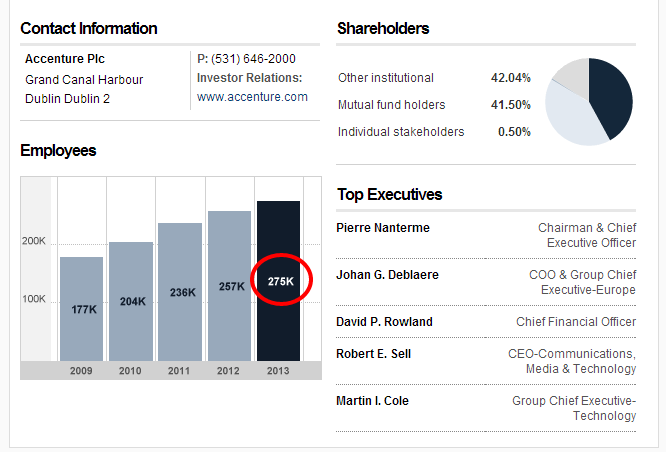
So, the firm is estimated at 50+ billion (this is a big one). And they have 275,000 employees, and the number of employees is constantly growing.
By the way, in the same place you can find the names of the company's management and, for example, read their interviews in order to understand their plans, values and all that. But this is already on the limits of our rather superficial analysis.
2) Does the company grow in the long term. It is hardly worth going to work in a company that has been decaying for a long time, especially if there are other options. We look at Accenture:
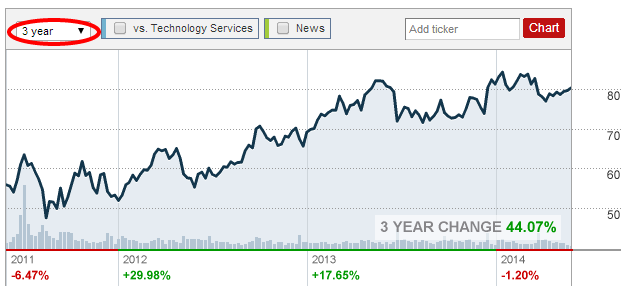
Over the past 3 years we have seen quite stable growth. This is a good sign.
3) Look at the predictions of analysts. Trend is positive. Another good sign in the piggy bank!
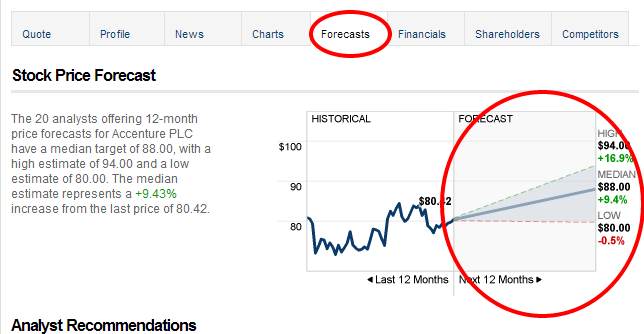
4) Quickly review the latest news reports. The main thing is that there were no articles like “the CEO committed suicide”, “10,000 employees are suing the company” and other apocalypses. With Accenture, everything is clean.

There is still a lot of information to explore at your discretion - this is only the most basic.
What does it mean?
The lack of negative signals does not mean that it’s cool to work there and everything will be in chocolate. Of course, it is worth exploring other sources, and try to understand what the corporate culture is or how the company treats employees.
On the other hand, if there are negative signals, and especially if there are a lot of them, then this is definitely a reason to be wary!
Conclusion
If you want to try your hand, the process is not easy and not fast. And, perhaps, there will be no refusal before receiving a job offer. This is normal and expected, and then you should not give up and get upset. The main thing to remember is that
Information + Preparation + A little luck = Getting what you want, sooner or later, anyway
Source: https://habr.com/ru/post/285640/
All Articles